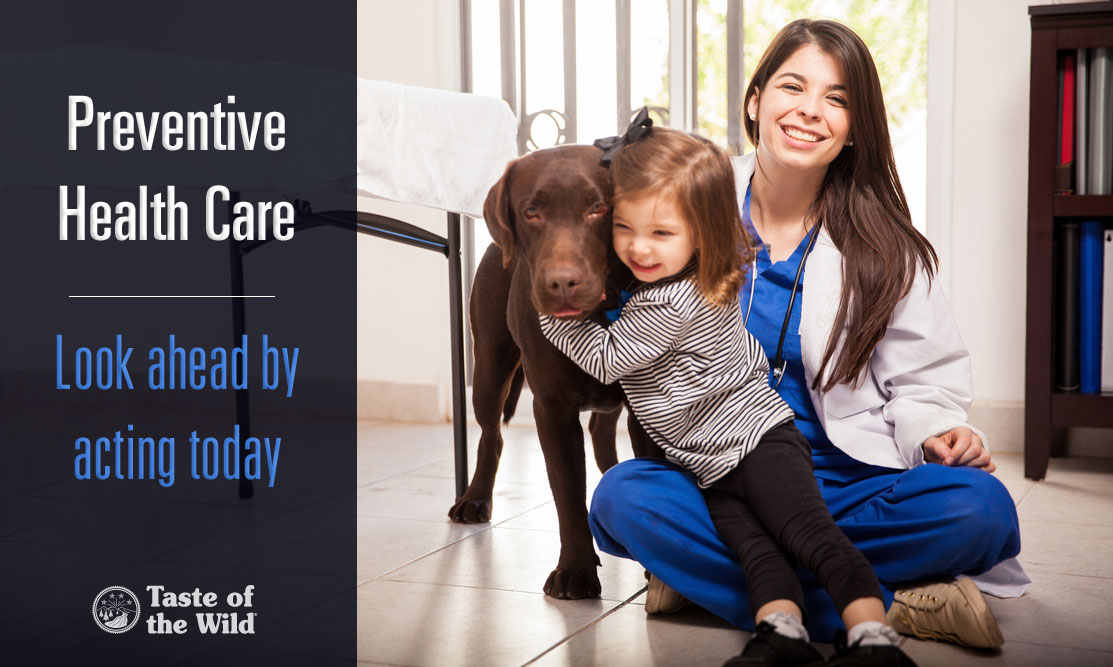Preventive Health Care for Pets
Thursday, January 30, 2020 | Health

When it comes to veterinary care, many pet owners subscribe to the old axiom, “If it ain’t broke, don’t fix it.” In fact, the 2017-18 edition of the AVMA Pet Ownership and Demographics Sourcebook says that nearly 46 percent of cats and 17 percent of dogs didn’t visit their veterinarian during that span.
But waiting until something is “broke” is like waiting until your house is on fire before buying a fire extinguisher. By the time a pet shows signs of illness, the disease may have progressed so far that it may be more difficult and more expensive to treat than if it had been caught earlier — not to mention the extra discomfort the pet may have experienced.
Preventive healthcare…prevents
More and more, veterinarians encourage owners to focus on preventive healthcare. These simple steps can help prevent dogs and cats from contracting many diseases in the first place and may help detect problems earlier, when they may be more amenable to treatment — and when treatment typically has a smaller price tag.
The preventive care your pet requires will depend on the animal’s age, lifestyle, health status and risk factors for disease. Your veterinarian can tailor a preventive care plan for your pet’s precise needs, but it will most likely include some of the following:
Annual physical exams
Your pet should be examined by a veterinarian at least once a year. If he or she is older or currently has a health condition, those visits should be even more often. The goal is to detect subtle signs of disease as early as possible, or to monitor disease progression to keep your pet healthy and comfortable for as long as possible. It’s also a good opportunity to discuss any concerns about your pet’s behavior and general well-being.
Spay and neuter
Neutering a male pet early helps prevent testicular cancer and prostate disease. Likewise, spaying female cats and dogs when young can help reduce the risks of mammary cancer and pyometra, an infection of the uterus that often requires emergency surgery. Appropriate timing for this important surgery should be discussed with your veterinarian and may vary based on your pet’s breed and lifestyle. Sterilization can also help reduce behaviors such as roaming, urine marking and aggression.
Screening tests
Many health conditions aren’t obvious to the naked eye. That’s why your veterinarian may recommend tests to help detect diseases early, such as urinalysis and general blood tests as well as more specific diagnostic tests to check for thyroid disease, feline leukemia and more. Depending on your pet’s age, your veterinarian may also suggest other diagnostics such as X-rays or blood pressure measurements.
Nutrition/weight management
Research has shown that keeping your dog lean can actually help prolong life, and the same is most likely true for cats. You can help achieve this by feeding a complete and balanced food designed for your pet’s life stage, providing regular exercise and not going overboard on treats.
Dental care
Dental disease is one of the most common — and preventable — conditions in dogs and cats. It’s often painful. It can lead to tooth and bone loss. And dental infections can spread bacteria to organs throughout the body. Regular dental exams and prophylactic cleanings can help remove tartar and bacteria under the gum and freshen breath. Even better, regular at-home tooth brushing can help extend the time between professional cleanings.
Vaccinations
Some vaccines, such as rabies, are required by law, but others are important to help protect your pet from serious and potentially fatal diseases. Indoor-only pets can still be exposed to viruses, so you should discuss your pet’s disease risks with your veterinarian and select the right vaccination program for your pet.
Parasite protection
All pets, even those who are indoor-only, should be on year-round, broad-spectrum parasite control for intestinal worms and heartworm. Regular fecal exams are also important, not just for your pet’s health but because many intestinal parasites can be spread to your human family members. You should also consult your veterinarian about flea and tick control; risks for these pests depend on your area.
The whole package
To help encourage more pet owners to focus on preventive healthcare, many veterinarians offer special packages that bundle these services, often at a discount. That way, you know exactly what your pet needs for the year. Even better, you can probably spread the expenses out over the year so it’s easier on you, too. And that makes your next trip to the veterinary clinic relatively painless for everyone.
The information in this blog has been developed with our veterinarian and is designed to help educate pet parents. If you have questions or concerns about your pet’s health or nutrition, please talk with your veterinarian.




